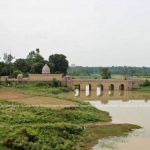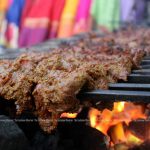Iftikhar Arif Hussain
A Poet without Boundaries
“duniya badal rahi hai zamane ke sath sath
ab roz roz dekhne wala kahan se laaen”
The poet’s story reads from behind an iridescent, profound and musical veil of beauty. The origin itself a craved pedestal of a rare incident. It is difficult to restrain the words from running into that pure finesse, delicacy and meticulousness that is the Urdu tongue emerging fresh from a spell of his magical verses. The Indian Pakistani poet is a widely celebrated scion of Urdu poetry and it would serve to say delving in his work is sure to turn any beginner into thankful enthusiast of his delicate and spirited craft of romantic Urdu poetry.
His acclaim is stamped with eminent honours, Hilal-i-Imtiaz (2005), Sitara-e-Imtiaz (1999), Pride of Performance (1990) – the highest literary award conferred by the Pakistani government, Baba-e-Urdu Maulvi Abdul Haq Award, (poetry, 1995), Naqoosh Award (1994), Faiz International Award for Poetry by Aalami Urdu Conference and many other national and international credits bear his name.
Born on March 21, 1943 in Lucknow he received his education from a glittering decoration of Lakhnavi institutes, studying at the Madressa-i-Nizamia, Farangi Mahal, and Government Jubilee College, completing his masters from Lucknow University. Ehtisham Hussain was his distinguished teacher. The roots that founded this great romantic poet were planted in the refined, cultural hub of Lucknow, then flourishing with an effusive, overarching breed of poets like Josh Malihabadi, Majaz, Ali Sardar Jafri were some of the many behind the soulful poetry evolving at this age. It was in this enriching environment that Iftikhar Arif began his journey and he fondly remembers its beauty.
Another era is revealed through poetic gates, this poignant group of poets walking along the Gomti and infusing its air with their verse.
His captivating verse is crowned with the depth and emotional pitch of his voice, taking the listener to the core of feelings with first evocation. He speaks with a characteristic softness of tone, for which it is said that ‘Sargoshiyon Se Guftagu Karte Hain’ a quality he attributes proudly to his Lucknowi origin, where raising your voice was considered a profanity, everyone knew Urdu, English or Hindi, and the issue of all language in the air was a soothing balm. Like many of his contemporaries he laments the loss of that ‘adab’ and ‘tehzeeb’, which formed the soul of Lucknow and gave birth to these geniuses.
This place he so loved, he was uprooted from, in the grim shadow of partition. He landed in Pakistan in 1965. Of those times of unrest and uncertainty he writes:
Abhi kuch din lagain ge
Dil aisay sheher ke paamaal ho jaanay ka manzar bhoolnay meinAbhi kuch din lagain ge
Jahaan-e-rang ke saaray khas-o-khaashaak Sab sarv-o-sanobar bhoolnay meinAbhi kuch din lagain ge
Thakay haaray huye khwaabon ke saahil per Kaheen ummeed ka chhota sa ik ghar Bantay bantay reh gaya haiWoh ik ghar bhoolnay mein, Abhi kuch din lagain ge
Once in Pakistan he started working with Radio Pakistan charming the audience with his voice and intellect. At 23, he was the youngest producer. A fervent scholar as well, he attained popularity with a television quiz show ‘Kasauti’ along with Obaidullah Baig. His entire career span and life in fact is lit with valued associations with eminent figures of Urdu poetry, his valued friends and colleagues.
Thereon for the next thirteen years he allowed England to enjoy the bounty of his art, working in the Bank of Credit and Commerce International (BCCI) that sponsored the Urdu Markaz. On his return he headed the National Language Authority (Muqtadara Qaumi Zaban), and became chairman of the Pakistan Academy of Letters (PAL). Currently he is chairman of the NLA.
The merit of his being is his poetry as well as personality, soft-spoken, modest, earnest and passionate, he resounds a poet’s belief in the curious plague particular to poets ‘the nightingale fever’, ‘the inability to stop singing regardless of the consequences’. He says poetry was his fate, and if he it was within his power he would seal his next life with the same. Few men can say the realm ruled by the heart is forever victorious, but his is for a fact and he beliefs in being led by this feeling force. It is this passion of the soul that surfaces in his work and arrests the reader or fortunate listener.
He writes about human suffering, alienation, loss, exile masking them in subtle metaphors, rich allusions, in the practise of ancient Urdu and Persian poetry treading on a sound blend of classical and modern poetry making his poetry universally relevant. His deep and astute understanding of life makes him prolific philosopher .His poetry has been termed as existential. Prof Mujtaba Husain feels that “Iftikhar Arif’s poetry has the dash and pomp of Aatish and Yagana but he is without their aggression.” His eminent admirers being Annemarie Schimmel, Mumtaz Mufti, Meerza Adeeb, Ahmed Nadeem Qasmi, Mushtaq Ahmad Yusufi, Anna Suvorova and Upinder Nath Ashk. It’s this universal voice that has led to global acclaim; his poems have been translated into many languages. Mehr-e-Doneem, Harf-e-Baryab and Jahan-e-Maloom are three of his most celebrated collections.
‘Chup Dariya’, a recording of his ghazals rendered and acknowledged by the legendary singers, ‘Malika-i-Mauseeqi’ the late Roshanara Begum, Late Noor Jahan and Iqbal Bano.
Looking at the man, hearing his philosophy, one cannot be but awed by the beautiful wealth of his notions, in one of his most famous poems ‘Baarahwan Khiladi’ he writes,
Tum Bhi Iftikhar ‘Arif’ Baarahwain Khilari Ho Intezar Kartey Ho Aik Aise Lamhe Ka Aik Aisi Saa’at Ka Jis Main Haadsa Ho Jaaye Jis Main Saaniha Ho Jaaye.
“Jab ‘Mir’ o ‘Mirza’ ke sukhan raaegaan gae
Ek be-hunar ki baat na samjhi gai to kya”
Nikita Gupta
Writer is student and her passion is painting
(Published in The Lucknow Observer, Volume 1 Issue 12, Dated 05 March 2015)




